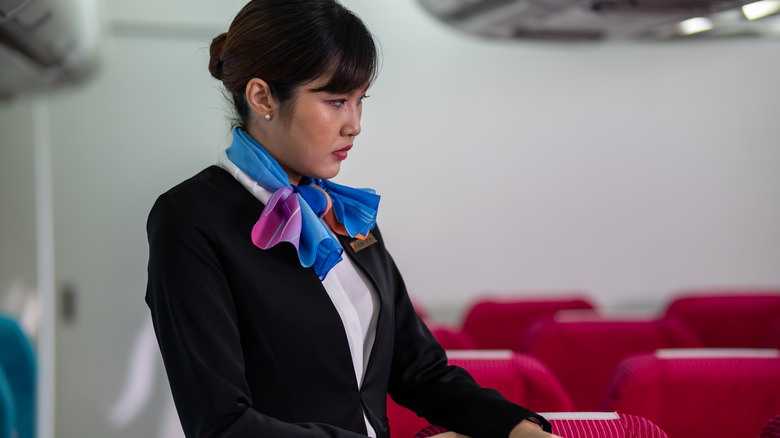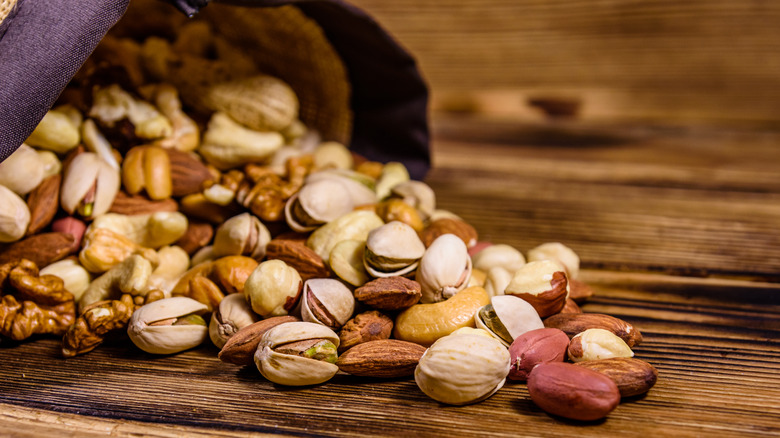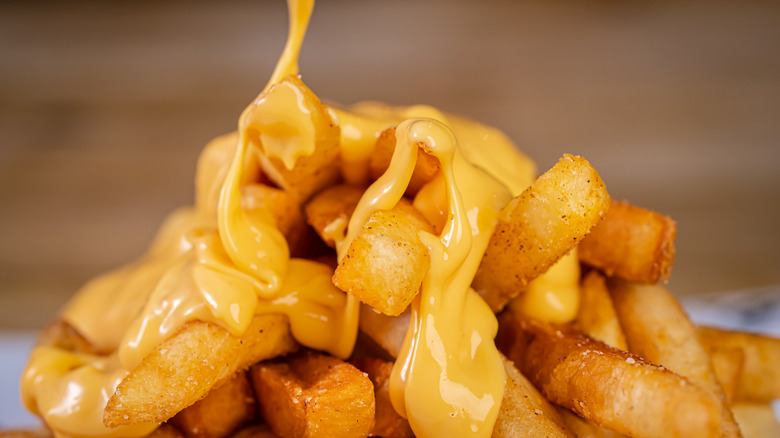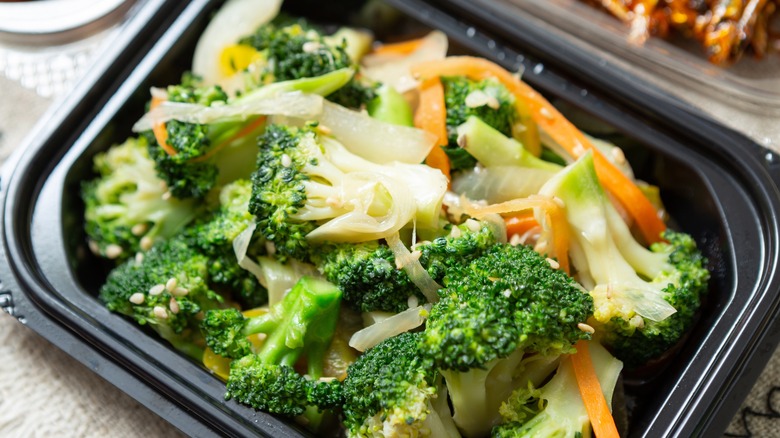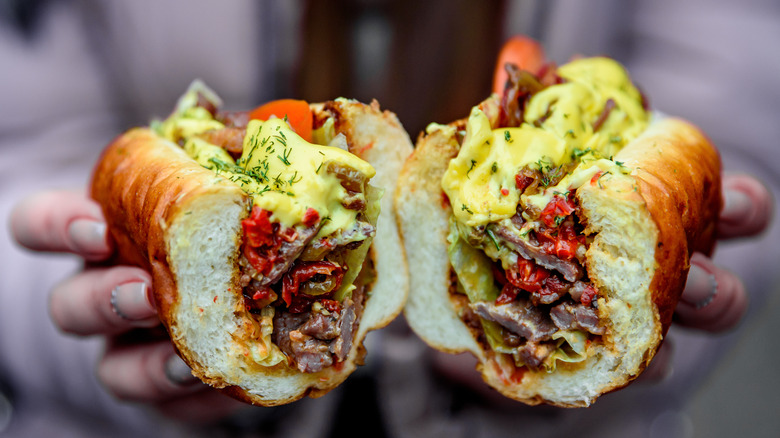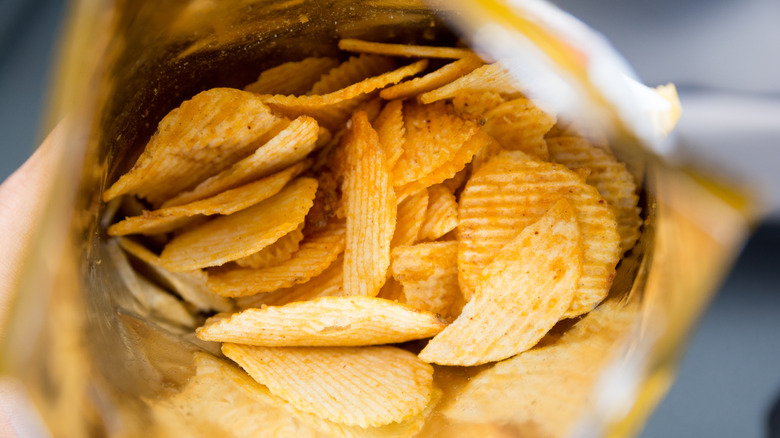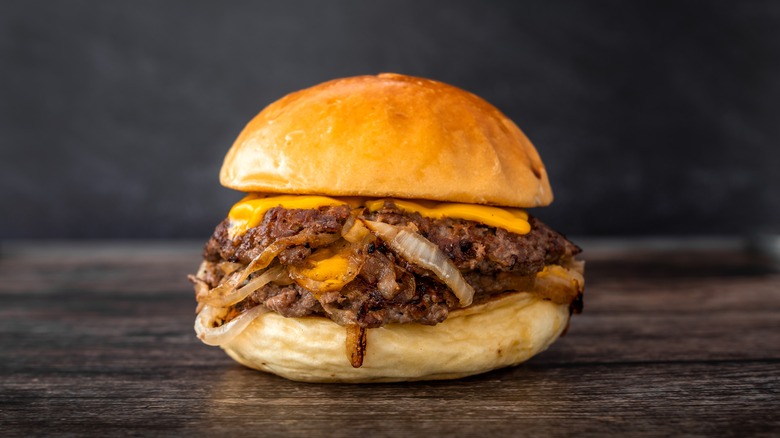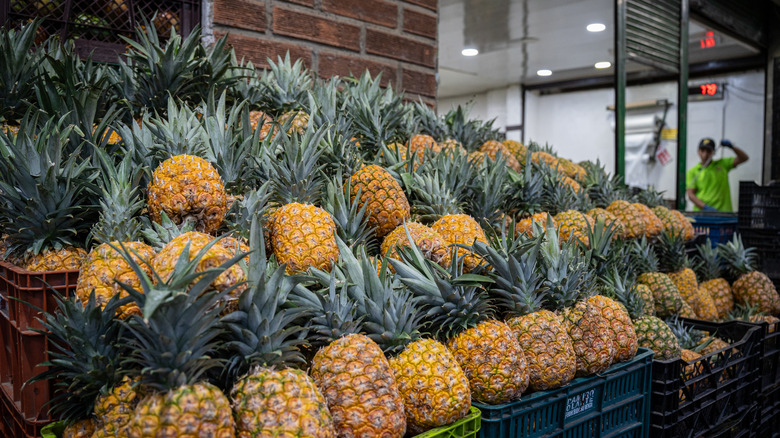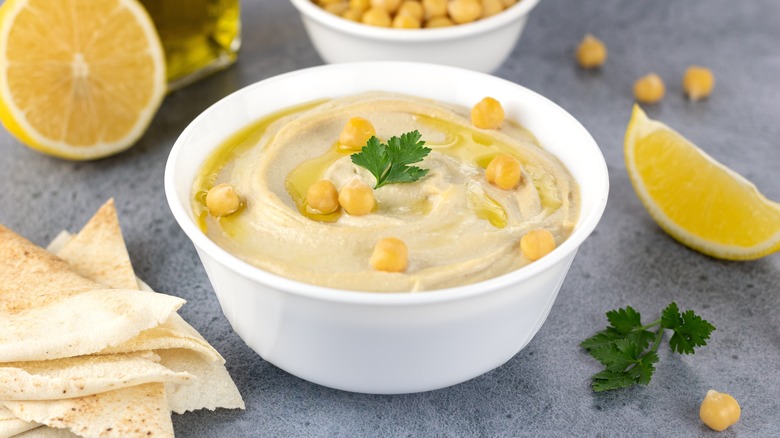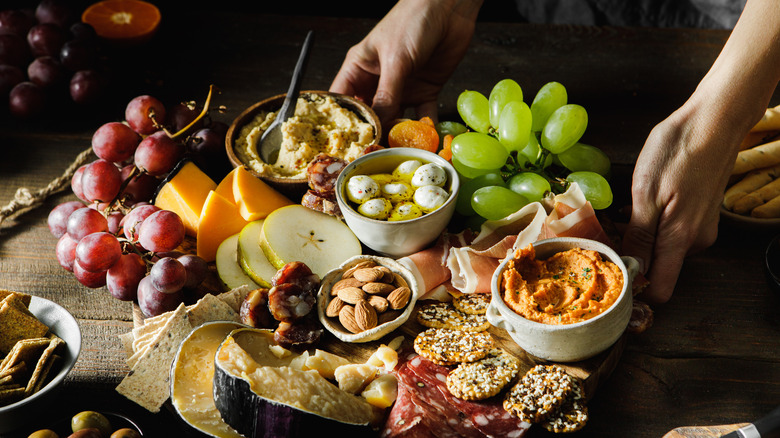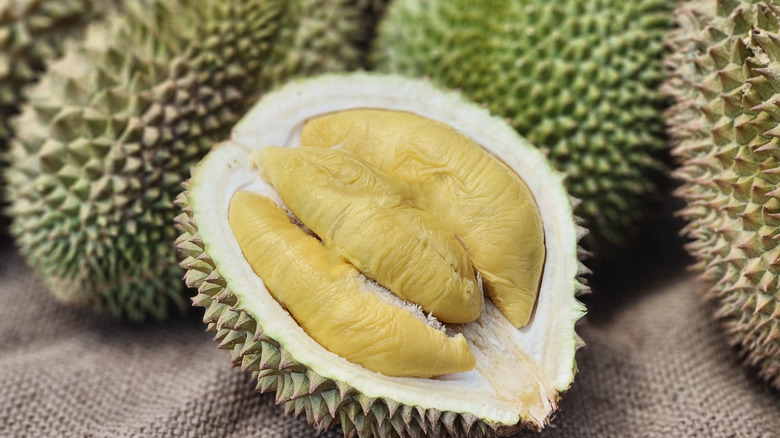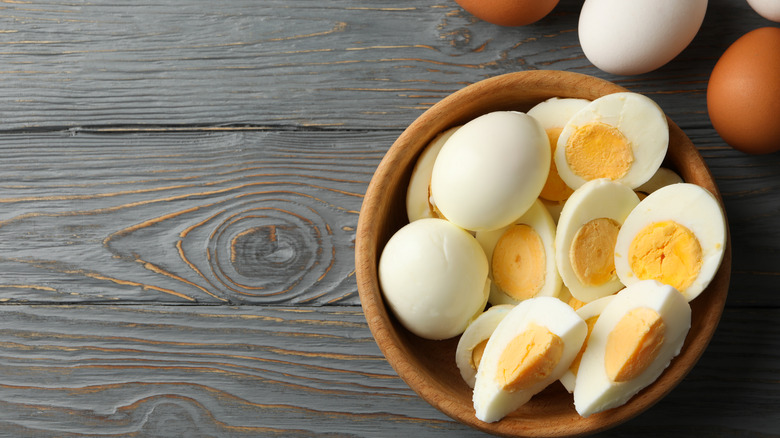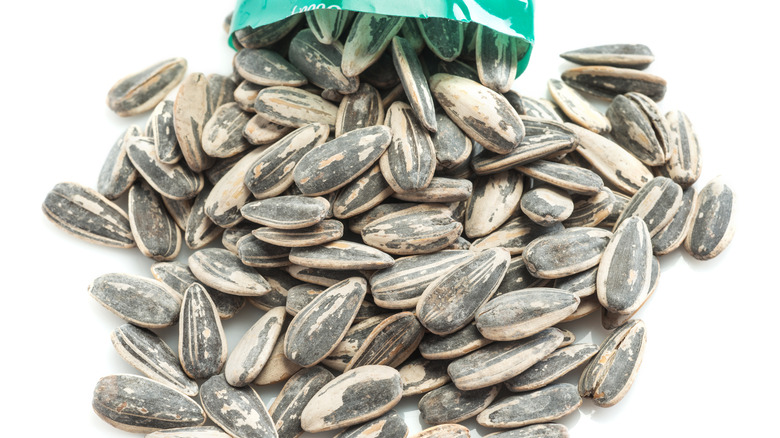Snacks Flight Attendants Wish You Would Just Stop Eating On The Plane
Whether it's a matter of personal preference, a money-saving measure, or a dietary issue, many travelers board a flight bearing their own snacks. But not all airplane snacks are created equal — and we're not just talking about the taste. Whether they're too smelly, messy, noisy, or downright life-threatening to other people on board, the snacks you choose to take on a flight could cause resentment or even a fight between you and fellow passengers. They're even more likely to frustrate your flight attendant, who risks getting stuck smelling stinky food, cleaning up a mess, or trying to resolve a conflict between passengers, all because of a snack someone brings on board.
Before you pack your carry-on, think about the snacks you're bringing for the flight. Can you eat them without bothering anyone on board? For instance, safe options include granola bars, pretzels, non-sticky breakfast pastries, apple slices, cookies, and M&M's or candy. If these airplane snack ideas don't inspire you, keep this list in mind when you're on your airplane snack run so that you can avoid bringing ones that flight attendants hate.
Nuts
Nuts are a delicious, healthy snack, but many flight attendants hate it when passengers bring nuts on a flight. For one thing, shelled nuts can be messy. In an ideal world, passengers would collect their discarded nut shells and throw them away. But unfortunately, not every human being who flies got this memo. Some passengers will leave nut shells on the floor or even in the nooks and crannies of their seats. Even if they collect the shells and throw them away, a few pieces are very likely to be overlooked.
But there's an even worse side to nuts: They can be life-threatening for people with nut allergies. In fact, because of this, you may not be able to eat the nuts you brought onto the plane in the first place. While the TSA allows nuts in carry-on luggage, some airlines may try to enforce a nut-free flight by doing things like banning the sale or serving of nuts on flights and asking passengers not to open products containing nuts. That said, most airlines specify that they can't guarantee a nut-free flight. This means that technically, nut fans can enjoy their favorite airplane snack, but they may face conflict with fellow passengers, which flight attendants are likely to have to try to mediate.
Messy foods
When it comes to airplane snacks, some people go a little bigger, bringing a sandwich or other light meal slathered in a sauce or cheese that could end up somewhere beside their mouth or napkin. Keep in mind that although the TSA restricts the amount of liquid elements (like sauces) you can bring in your carry-on, a lot can go a long way. And, of course, you can bypass the restrictions and get a messy snack at the airport terminal. "Messy" doesn't just include sauces, though. Even common snack foods like Cheetos can cause quite the mess, leaving crumbs and cheese-stained fingerprints everywhere — and flight attendants might get caught with the cleanup.
The North Carolina Division of Employment Security Commission specifies that "cleaning the plane is not [flight attendants'] primary duty," and yet, attendants often find themselves involved in helping passengers remove stains and messes. Also, many describe flight attendants' primary duty as ensuring security during a flight, which may come into play if a messy snack causes conflict among passengers or becomes a potential tripping hazard.
Foods with strong smells
We all have our favorite snack foods, and there is no issue with enjoying them in most places. But while you may adore pungent treats like soft cheese, kimchi, and garlic, not everyone agrees. There are few places where this applies more than on an airplane, where people are packed into a small space with recirculated air.
In fact, of all the challenges they have to deal with, flight attendants interviewed by Today listed smelly foods as one of their top five pet peeves. In a season 2 episode, the hosts of The Flight Attendant Podcast also called out pungent snacks as one of the worst foods a passenger can bring aboard a flight. The ones they dislike the most include broccoli and fish. Not only do these foods make flight attendants suffer, but they also frequently cause fellow passengers to complain, which, once again, can lead to conflict. Before you pack your airplane snacks, consider how strongly they smell, or ask a friend or family member what they think.
Big sandwiches
Flight attendants hate messy or smelly snacks, and a big sandwich can be the perfect storm of these two unpleasant elements. Sure, sub sandwiches, sloppy joes, and other sandwiches bursting with ingredients and packed with sauce or juices are delicious and filling, but your little tray table is unlikely to catch all the falling and dripping ingredients, making for a major mess. The ingredients that give your sandwich its strong, delicious flavor can also be the source of pungent smells that may not please everyone onboard, flight attendants included. Flaky bread is also an issue, leaving crumbs everywhere. It's just one thing after another.
Though it may not be your first choice, the perfect sandwich to fly with should be encased in non-flaky bread and not be overflowing with ingredients. One easy way to have a neat but filling and flavorful sandwich experience in-flight is to opt for a wrap instead. If you aren't a fan, try to use sliced bread and keep strong-smelling ingredients to a bare minimum, or, ideally, exclude them altogether.
Noisy food
Another thing to consider when packing airplane snacks is the noise they make. In an interview published in The Washington Post, flight attendant Shanie Peralta suggests avoiding noisy food, which can annoy passengers and flight attendants alike. One major offender is chips. Of course, plenty of people bring bags of chips on flights, and a small packet may even come with your in-flight meal or snack. But let's face it: If you're traveling when passengers are likely to be sleeping, a giant, crinkly bag of chips may not be the most considerate of options. Not to mention the mess they usually leave behind, from grease on your hands and anything you touch to getting crumbs everywhere. If you can, leave the chips at home.
Identifying noisy snacks isn't always easy since some people aren't annoyed only by loud noises but also by excessive eating-related sounds like chewing. You may not be able to prevent this issue, but trying to pack relatively "quiet" foods, especially if you're on a flight where people will probably be sleeping, is a responsible move.
Greasy food
Sure, some greasy foods can be delicious, but they tend to linger not just on your taste buds but also on your hands, which will be touching lots of other surfaces on the plane, from your tray table and armrest to shared areas like lavatory doors. No one likes the icky feeling of greasy residue, especially if they're not the culprit.
Greasy snacks also have a higher likelihood of upsetting your stomach. That irresistible burger or those extra greasy chips might end up causing an unspeakable mess that your flight attendant has to help clean up. You may end up needing the lavatory so often that it inconveniences fellow passengers, making your flight attendant's job even more challenging. If you can, try to think of alternatives to your favorite greasy snacks. If you can't resist them, bring wet wipes or another way to clean your hands and surfaces you've touched while enjoying them. You may also want to consider bringing an antacid and sick bag in case things take a turn for the worse.
Restricted fruits and veggies
As a general rule, taking fruits or vegetables onto a flight can be risky, especially if the flight is international or covers large amounts of territory. As U.S. Customs and Border Protection sternly puts it, "Prohibited agricultural items can harbor plant pests and foreign animal diseases that could seriously damage America's crops, livestock, and the environment." While you're probably okay bringing an apple with you on a flight from Cleveland to New York, you'll probably have trouble bringing fruit from international destinations, as well as U.S. states or territories like Hawaii and the U.S. Virgin Islands.
What does this have to do with flight attendants? Countless sources, including Avis Aviation Academy, note that one of the most difficult parts of a flight attendant's job is dealing with difficult or unruly passengers. Getting food confiscated can put a passenger in a bad mood, and if they can't replace their snack with something else, they might get downright hangry. The result could range from complaining to flight attendants to getting into conflicts with other passengers, scenarios any flight attendant would want to avoid. Before you fly, check TSA restrictions and any other applicable rules at your arrival and destination locations.
Food that goes over the TSA (or other governing body) limit
Restricted fruits and vegetables aren't the only snacks that you might not be able to bring onto your flight. You may already know that the TSA allows only 100 milliliters or 3.4 ounces per liquid or gel item, with all items being able to fit in a quart-sized resealable bag. You might not have considered that these guidelines also apply to snack items like soft cheese, yogurt, hummus, and spreads. Peanut butter is also on this list, making it a restricted item and a problematic snack because other passengers may have nut allergies. Some food items might also be prohibited if you're traveling internationally.
Consider these restrictions before you pack your favorite airplane snack. If you have doubts about anything else you want to pack, check the TSA online guidelines, which include a helpful, extensive list of food items and rules regarding your destination country if traveling internationally. After all, without a good snack on your flight, you risk joining the ranks of hangry, unruly passengers that flight attendants dread.
Snacks that create clutter
When we think of a snack, it's usually a small item, but hungry minds can be ambitious. You may have brought several dozen things to dip into your small, TSA-approved amount of hummus, or you may want to mix and match an array of salty snacks, keeping them on your tray at the same time. No matter how appealing these ideas might be, keep in mind that clutter and airplanes are a tricky pairing. As flight attendant Shanie Peralta points out, all that clutter could cause you to accidentally splatter or spill on a passenger seated beside you. The same might happen when your flight attendant is helping you clear your tray.
Another surefire way clutter can drive flight attendants crazy is that it might cause you to push the call button multiple times since you may get sick of the scattered items and want to throw them away as you go. A cluttered tray table makes it hard for fellow passengers to move past you if they need to leave their seats. And, of course, it won't be easy for you to move, either. This is especially important if there's an emergency. So, try to do as Peralta suggests and take "a minimalist approach to dining."
Durian
Known as "the king of fruits," durian is a spiky fruit with a pulpy, custard-like interior. Especially popular in Southeast Asia, its taste is a complex mix of flavors, but what makes durian stand out is its strong, unique odor. Just about everyone who has experienced the smell of durian has a particular way of describing it. You'll often hear things like onions or sweat and rotten flesh combined with a sweet, fruity aroma. That would be unpleasant for most people to smell on a flight, but durian's odor is so pungent that it can cause chaos. Culture site Asian Inspirations explains that the fruit has been responsible for hospital, subway, and school evacuations. BBC reported on a 2018 flight in Indonesia whose passengers refused to let their flight take off due to the strong smell of durian in the cabin (the source of this smell was actually a shipment of durian stored in the cargo hold).
Many Southeast Asian countries ban the eating of durian in public places, and almost all of the world's airlines ban passengers from bringing it aboard, either in the cabin or in their checked luggage. Still, if you're a durian fiend willing to risk it all, keep in mind that even if the smell doesn't get you flagged by security, bringing it on a flight can cause issues with passengers and maybe even a flight delay, which isn't going to endear you to any flight attendants.
Hard-boiled eggs
Of all the snacks on this list, hard-boiled eggs may be the most controversial. On the one hand, they might seem like a perfect airplane snack. They're small, fairly neat, and full of nutrients. You'll often see hard-boiled eggs on lists of the best foods to bring on a flight, and even lifestyle maven Martha Stewart considers hard-boiled eggs one of her go-to in-flight snacks. But many other passengers think hard-boiled eggs and airplanes are a terrible mix. The reason? For many people, hard-boiled eggs stink. Many flight attendants seem to agree, including The Flight Attendant Podcast host B, who included hard-boiled eggs in the three foods she hates the most on planes.
If you don't want to risk frustrating your flight attendant, consider leaving your hard-boiled eggs at home. Or if they're a travel must for you, consider eating them before you board. A Reddit thread went viral after one user complained about a passenger enjoying some hard-boiled eggs while waiting at the gate for his flight. The comments the post garnered largely were in favor of the hard-boiled egg fan eating his snack quietly in a large space rather than inside an airplane cabin.
Sunflower seeds
Sunflower seeds are an addictively delicious and healthy snack. It's not surprising that some people choose sunflower seeds as their airplane snack. What is surprising is that, for some reason, many people throw sunflower seed shells on the floor of the plane. This rude and unsanitary behavior is common enough for photos and videos of the act and its aftermath to frequently appear on social media. Officially, a cleanup crew is responsible for taking care of the shells. If they're a major problem during the flight, a flight attendant might have to get involved, either by having to tell the passenger to pick them up or even helping with this unpleasant task — not to mention handling complaints from fellow passengers or possibly stepping on the shells if they have to lean into the row.
In addition to causing some passengers to forget their manners, sunflower seeds are also a snack flight attendants hate because of the potential health risks. Although it's rare, some people with nut allergies can be also allergic to sunflower seeds. So, replacing your beloved sunflower seeds with another airplane snack is the best choice. If you can't or don't want to do this, choose the unshelled variety, or at least bring an empty bag or other small container for the shells, and then throw everything away.
